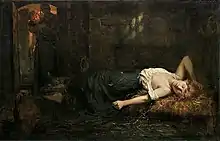Après moi, le déluge
"Après moi, le déluge" (pronounced [apʁɛ mwa lə delyʒ]; lit. 'After me, the flood') is a French expression attributed to King Louis XV of France, or in the form "Après nous, le déluge" (pronounced [apʁɛ nu lə delyʒ]; lit. 'After us, the flood') to Madame de Pompadour, his favourite.[1] It is generally regarded as a nihilistic expression of indifference to whatever happens after one is gone,[2] though it may also express a more literal forecasting of ruination.[3] Its meaning is translated by Brewer in the forms "When I am dead the deluge may come for aught I care", and "Ruin, if you like, when we are dead and gone."[4]
| Part of a series on |
| Nihilism |
|---|
 |
|
The phrase itself is in reference to the biblical flood[5] and is believed to date from after the 1757 Battle of Rossbach, which was disastrous for the French.[6] One account says that Louis XV's downcast expression while he was posing for the artist Maurice Quentin de La Tour inspired Madame de Pompadour to say: "Il ne faut point s'affliger; vous tomberiez malade. Après nous, le déluge."[7][note 1] Another account states that the Madame used the expression to laugh off ministerial objections to her extravagances.[4] The phrase is also often seen as foretelling the French Revolution and the corresponding ruin brought to aristocratic decadence.[8]
Karl Marx and Fyodor Dostoevsky apply the phrase in their writings to describe the selfishness and apathy of certain corrupting values.
Usage
Karl Marx wrote in Das Kapital (Vol. 1, Part III, Chapter Ten, Section 5) "Après moi, le déluge! is the watchword of every capitalist and of every capitalist nation. Hence Capital is reckless of the health or length of life of the labourer, unless under compulsion from society."[9]
During the trial of Dimitri Fyodorovich Karamazov in The Brothers Karamazov by Dostoyevsky, the prosecution uses the expression to describe the attitude of the defendant’s reprobate father and to lament the deterioration of Russian values more generally.
In his writings of the 1920s, D. H. Lawrence uses the expression a number of times, calling it "the tacit utterance of every man", in his "crisis" of unbearable "loneliness ... surrounded by nullity".[10] But "you mustn't expect it to wait for your convenience," he warns the dissolute "younger generation";[11] "the real deluge lies just ahead of us".[12]
"Après moi le déluge" was adopted as the motto of the Royal Air Force 617 Squadron, which carried out the "Dambuster" raids on German dams in the Ruhr region on the night of 16–17 May 1943.
In his Senior year at The Bishop's School in LaJolla, California, serial killer Andrew Cunanan used it as his yearbook quote.[13]
See also
Notes
- transl. "There is no need to grieve; you'll make yourself ill. After us, the deluge."
References
- Mould 2011, p. 43; Lexico.
- Nishitani 1990; Lexico
- Laguna 2006.
- Brewer 1898.
- Ammer 2013.
- Mould 2011, p. 43.
- Mould 2011, p. 43
- Farlex.
- Das Kapital, Chapter 10
- "The Crown", IV (1925) in Reflections on the Death of a Porcupine and Other Essays (Cambridge: Cambridge University Press, 1988), p280.
- "Latter-Day sinners" from Pansies (1928) in Poems, Volume 1 (Cambridge: Cambridge University Press, 2013), p461.
- "The Memoires of Duc de Lauzun", Version 1 (1926) in Introductions and Reviews (Cambridge: Cambridge University Press, 2005), p91. Lawrence also uses the phrase in "Whitman" (1923), calling it "the soul's last shout and shriek, on the confines of death", Studies in Classic American Literature (Cambridge: Cambridge University Press, 2003), p155.
- "Andrew Cunanan's Yearbook Quote is Frightening". www.yahoo.com. Retrieved 4 February 2021.
Sources
- Ammer, Christine (2013). "Après moi le déluge". Dictionary of Clichés. New York: Skyhorse Publishing. ISBN 978-16263-6011-2.
- Brewer, Ebenezer Cobham (1898). "Del'uge". Dictionary of Phrase and Fable. Retrieved 17 October 2020 – via Bartleby.com.
- Laguna, Gabriel (13 January 2006). "The Expression 'Après moi le déluge', and Its Classical Antecedents". Tradición Clásica. Blogspot.com. IBSN 30-48-327-363.CS1 maint: date and year (link)
- Mould, Michael (2011). The Routledge Dictionary of Cultural References in Modern French. Routledge. p. 43. ISBN 978-0-203-83092-5.
- Nishitani, Keiji (1990). McCormick, Peter J. (ed.). The Self-Overcoming of Nihilism. Translated by Graham Parkes; with Setsuko Aihara. State University of New York Press. ISBN 0791404382.
- "Apres moi le deluge". Farlex Dictionary of Idioms. Farlex. 2015. Retrieved 15 December 2020.
- "Après nous le déluge". Lexico. Oxford. Retrieved 17 October 2020.